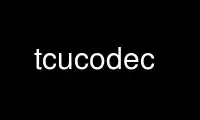
This is the command tcucodec that can be run in the OnWorks free hosting provider using one of our multiple free online workstations such as Ubuntu Online, Fedora Online, Windows online emulator or MAC OS online emulator
PROGRAM:
NAME
tcucodec - popular encoders and decoders
DESCRIPTION
The command `tcucodec' is a tool to use encoding and decoding features. This command is
used in the following format. `file' specifies a input file. If it is omitted, the
standard input is read.
tcucodec url [-d] [-br] [-rs base] [file]
Perform URL encoding and its decoding.
tcucodec base [-d] [file]
Perform Base64 encoding and its decoding.
tcucodec quote [-d] [file]
Perform quoted-printable encoding and its decoding.
tcucodec mime [-d] [-en name] [-q] [-on] [-hd] [-bd] [-part num] [file]
Perform MIME encoding and its decoding.
tcucodec hex [-d] [file]
Perform hexadecimal encoding and its decoding.
tcucodec pack [-d] [-bwt] [file]
Perform Packbits encoding and its decoding.
tcucodec tcbs [-d] [file]
Perform TCBS encoding and its decoding.
tcucodec zlib [-d] [-gz] [file]
Perform ZLIB encoding and its decoding.
tcucodec bzip [-d] [file]
Perform BZIP2 encoding and its decoding.
tcucodec xml [-d] [-br] [file]
Process XML. By default, escape meta characters.
tcucodec cstr [-d] [-js] [file]
Perform C-string escaping and its unescaping.
tcucodec ucs [-d] [-un] [-kw str] [file]
Convert UTF-8 string into UCS-2 array.
tcucodec hash [-crc] [-ch num] [file]
Calculate the hash value. By default, use MD5 function.
tcucodec cipher [-key str] [file]
Perform stream cipher and its decipher.
tcucodec date [-ds str] [-jl num] [-wf] [-rf]
Process date string. By default, print the current UNIX time.
tcucodec tmpl [-var name value] [file]
Perform template serialization.
tcucodec conf [-v|-i|-l|-p]
Print some configurations.
Options feature the following.
-d : perform decoding (unescaping), not encoding (escaping).
-br : break up URL or XML into elements.
-rs base : specify the base URL and resolve the relative URL.
-en name : specify the input encoding, which is UTF-8 by default.
-q : use quoted-printable encoding, which is Base64 by default.
-on : output the charset name when decoding.
-bd : perform MIME parsing and output the body.
-hd : perform MIME parsing and output the headers.
-part num : perform MIME parsing and output the specified part.
-bwt : convert by BWT as preprocessing.
-gz : use GZIP format.
-crc : use CRC32 function.
-js : use JSON compatible format.
-un : perform UCS normalization.
-kw str : generate KWIC string.
-ch num : use consistent hashing function.
-key str : specify the cipher key.
-ds str : specify the time.
-jl num : specify the jet lag.
-wf : format the output in W3CDTF.
-rf : format the output in RFC 1123 format.
-var name value : specify a template variable.
-v : show the version number of Tokyo Cabinet.
-i : show options to include the headers of Tokyo Cabinet.
-l : show options to link the library of Tokyo Cabinet.
-p : show the directory path of the commands of Tokyo Cabinet.
This command returns 0 on success, another on failure.
Use tcucodec online using onworks.net services
